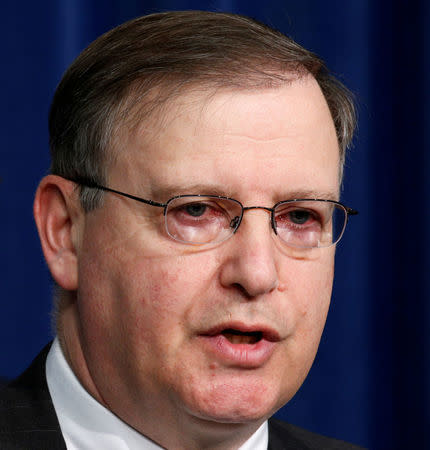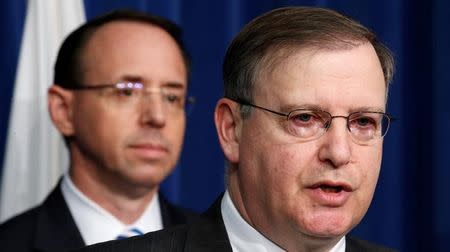U.S. drug enforcement chief to step down from agency
By Nate Raymond
(Reuters) - The U.S. Drug Enforcement Administration's acting director on Tuesday said that he will be leaving his post, two months after he criticized Republican President Donald Trump for telling law enforcement officers not to be "too nice" to suspects.
Acting Director Chuck Rosenberg, a holdover from Democratic President Barack Obama's administration, told the agency's staff in an internal email that he will be leaving his position effective Oct. 1.
"This is a remarkable agency - full of remarkable people - and I am honored to have been a small part of it," Rosenberg said in the message, which was reviewed by Reuters.
It was unclear who would replace Rosenberg. The news was first reported by The Washington Post.
A spokesman for the DEA confirmed Rosenberg's resignation.
Rosenberg had been leading the DEA in an acting capacity since 2015. Before joining the agency, he served as chief of staff to former FBI director James Comey, who Trump fired in May.
Rosenberg generated headlines earlier this year after he wrote an agency-wide email in late July challenging comments by Trump suggesting officers do away with practices like protecting the head of a suspect being put into a patrol car.
Citing "an obligation to speak out when something is wrong," Rosenberg said Trump's remarks, delivered in New York the previous day, "condoned police misconduct regarding the treatment of individuals placed under arrest by law enforcement."
He leaves the agency at a time when the DEA is grappling with the ongoing opioid drug epidemic, which has become a major law enforcement focus of the U.S. Justice Department.
Opioids, including prescription painkillers and heroin, killed more than 33,000 people in the United States in 2015, more than any year on record, according to the U.S. Centers for Disease Control and Prevention.
"Opioids such as heroin and fentanyl - and diverted prescription pain pills - are killing people in this country at a horrifying rate," Rosenberg said in December. "We face a public health crisis of historic proportions."
(Reporting by Nate Raymond in Boston; Editing by Phil Berlowitz)


